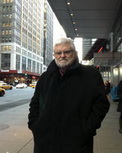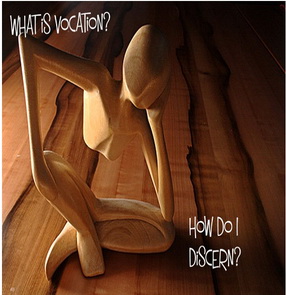 Chris
McDonnell, UK
Chris
McDonnell, UKchris@mcdonnell83.freeserve.co.uk
 Chris
McDonnell, UK
Chris
McDonnell, UK
chris@mcdonnell83.freeserve.co.uk
Previous articles by Chris Comments
welcome here Talking of vocation...
July
26, 2017

When we hear that 'next Sunday is Vocations Sunday' we immediately slip into a narrowly perceived view of a world populated by white collared priests and religious in habits particular to their Order.
All of us, in one form or another, have a vocation, a way of life that is peculiar to us, our own special way of being who we are.
I would like to explore that word 'vocation' a bit further, to ask a few questions as to its nature and the permanence of a particular acceptance.
Let us look in
particular at the monastic vocation. In many parts of our own country and
further across European countries, monastic communities of both men and
women are greatly reduced in size as the age profile of those remaining
rises. On a very practical level, the care of these aging communities is
becoming a matter of self-help, for the younger members of the communities
are no longer there to assist with the day-to-day chores of necessary
care. And will young men and women enter these communities knowing that a
critical aspect of their vocation will be one day soon of care in an old
people’s home?
Maybe there is a way forward.
Writing in the Foreword to the collection of essays, "A Monastic Vision for the 21st Century", Br. Patrick Hart OCSO, monk of the Abbey of Gethsemani in Kentucky, makes this comment.
"When I was younger in the monastic way I had dreams of a kind of monasticism in the Christian West that would be open to young men and women who, after completing their college work and before deciding on a life situation, would retire to a monastery for several years as part of their growth process, much like Hindu and Zen Buddhist monks of the Far East have done for centuries."
Patrick Hart was Thomas Merton's secretary.
Whatever the reason for their leaving and however long the monastic experience might have been, they will have been touched and changed by the daily pattern of prayer in community and that will remain with them in some form during subsequent years.
Our societal pattern is short term in so many ways. No longer is it the norm that there is a job for life from an early age. People move from one city to another, from one country to another. The very idea of stability is a memory. We seek different opportunities and re-train with new skills as the economic climate demands, often interspersed with periods of unemployment.
Our values, and the context in which we try to live them out, have changed radically in the last sixty years and so it should be no surprise given this upheaval across the countries of the West that our Church Community should likewise find itself under stress brought about by this change. It is a society with high material expectations which must add to the pressures on men and women making life decisions.
Retreating into a comfort zone "of what it used to be like", we can bemoan change and seek only to re-create what we know once existed, the patterns and structures that we (and our parents) felt secure within. It worked then, so why not now? We are surprised and saddened when that backward looking solution fails, as inevitably it will.
Those who see a return to a Church that is pre-Vatican II as a way forward are in fact walking into a cul-de-sac that offers only nostalgia.
We should however seriously reflect on what has been in the past and ask, in consequence, what might be in the future. How can we build on the experience of Christian formation over many centuries from the time of the Desert Fathers, through the Middle Ages and the growth of the great monastic orders of the day to where we are now, in a different world where change is both rapid and radical? The monastic vision of contemplative prayer has to be connected in some way to the current experience of Christian Faith.
The Taize Community that emerged in France under the leadership of Br Roger in the late '40s is evidence that there will be a response when a realistic connection is made with contemporary needs. The commitment of the Brothers at Taize is life-long but their pattern of living has broken new ground and young men and women the world over have recognised the integrity of their message and responded to it.
Where new tracks are taken after older walkways appear to have come to an end, the reason for the monastic choice, whether it is life-long or short-term, is to seek and experience the love of God. Only then can the patterns of life be determined and the nature of vocation understood.
END.